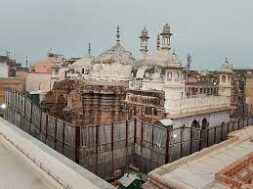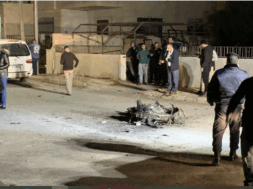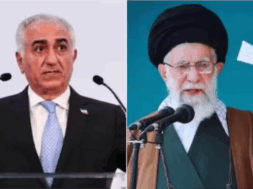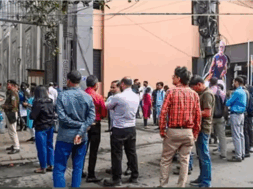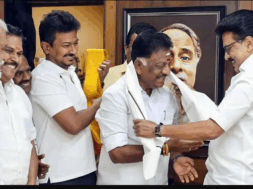
Manas Dasgupta
NEW DELHI, May 19: More evidences are claimed to have been found to establish the existence of Hindu temple on which the Gyanvapi mosque adjacent to the famous Kashi-Vishwanath temple in Varanasi, was built during the Moghul period.
The Hindu petitioners had earlier this week secured an order from the local court for “sealing” of the area in the mosque complex where they claimed to have found a “Shivling” under the ablution tank of the mosque. The mosque trust committee, however, had contested the Hindu claim and maintained the structure claimed as “Shivling” was nothing but part of a fountain in the mosque.
The report of the filming of the Gyanvapi mosque was submitted in the court on Thursday in connection with the case involving Hindu petitioners requesting access to worship what they claim are idols of Hindu gods and goddesses inside the mosque complex.
Ajay Mishra, a former court commissioner in the Gyanvapi Masjid case, on Thursday said broken pieces of several idols of Hindu deities were found during the court-mandated survey earlier this week.
He said the debris, which seemed like rubble from a temple, even had a hood of “Sheshnag” (a large serpent in Hindu mythology). “I was not allowed into the basement. The debris seemed 500-600 years old,” he said after submitting the survey report at a Varanasi court.
Ajay Mishra was part of the team that conducted a video survey of the Gyanvapi Masjid over three days. He alleged that the administration did not help in the survey and kept shrugging off responsibilities. Mishra “confirmed” the presence of a dome-shaped structure on the mosque premises but said he had not mentioned the same in his report. The structure is being claimed to be a Shivling by Hindus. The mosque committee has, however, refuted the claim, saying it’s a fountain, he said.
Special court commissioner Vishal Singh, who, too, submitted a report to the court mentioned the structure. He said many signs of the Sanatan culture were present inside the mosque. “Sanatan Dharma signs — such as lotus, damru (a small two-headed drum), trishul (trident) — were found on the walls of the basement,” he said. The memory chip of the video of the survey was also submitted by the commissioner to the court.
The Varanasi court had earlier sacked Ajay Mishra. He had allegedly hired a private cameraman, who has now been accused of leaking to the press.
Though the report was supposed to be only for the knowledge of the court, within hours of its submission a copy of the report, submitted in a sealed envelope, was shared by the lawyers of the petitioners apparently to back their claims of the presence of Hindu idols and symbols inside the Gyanvapi mosque.
The report shared by the petitioners says symbols of a “Trishul” or trident, lotus engravings and ancient Hindi carvings have been found in the video survey of the mosque complex right next to the Kashi-Vishwanath temple. The other findings as per the report included, the pillars in the basement of the mosque have engravings of flowers and a ‘kalash’ (pitcher).
- Carvings in “ancient Hindi language” have been found on a pillar in the basement.
- The symbol of a “Trishul” has been found on a wall of the basement.
- The team found two large pillars and an arch protruding from the western wall of mosque. The petitioners call them remnants of temples, but the mosque committee opposes that claim.
- A conical structure has been found below the central dome of mosque.
- A stone below the third dome of the mosque has lotus engravings.
- A round structure of 2.5 feet height has been noticed in the pond in the mosque complex used for “Wazoo” (purification ritual before namaaz). Petitioners call it a “Shivling” but the mosque committee says it was a fountain.
While there has been no official reaction from the Gyanvapi mosque committee, sources called it “surprising” that a sensitive report was shared even before the court could see it or give an opinion. None of this, the sources say, answers the question — whether the video survey violates the law, specifically the Places of Worship Act of 1991, which maintains the religious status of any place of worship as it was on August 15, 1947.
The mosque committee has challenged the filming inside the Gyanvapi complex citing the law. The committee on Thursday also submitted an affidavit in court opposing any demolition inside the mosque, which is part of a fresh request by the original petitioners.
The report was submitted in three sealed boxes and a chip with hundreds of video clips and photographs. The Varanasi court will hear the case next on Monday, after the Supreme Court, which takes up on Friday an appeal against filming in the mosque. Earlier on Thursday the Supreme Court had asked the Varanasi court not to proceed further in the case until Friday evening.
